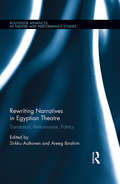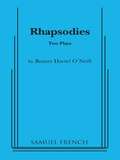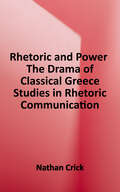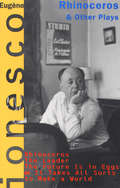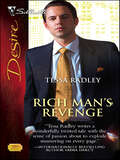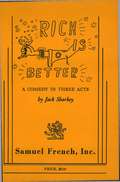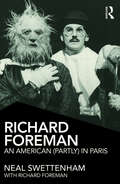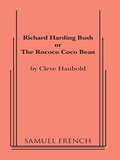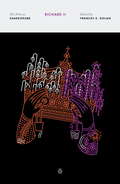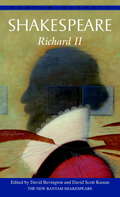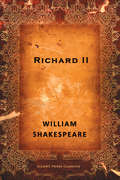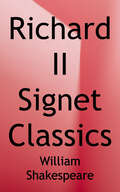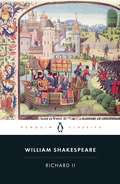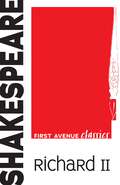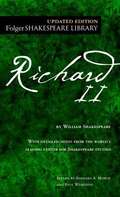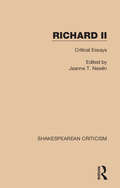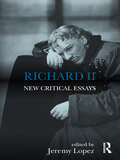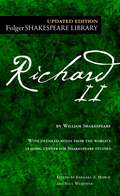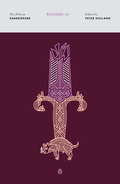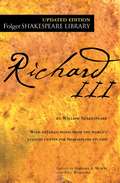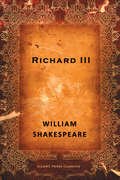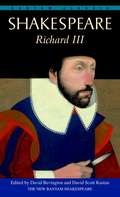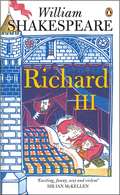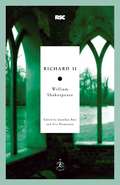- Table View
- List View
Rewriting Narratives in Egyptian Theatre: Translation, Performance, Politics (Routledge Advances in Theatre & Performance Studies)
by Sirkku Aaltonen Areeg IbrahimThis study of Egyptian theatre and its narrative construction explores the ways representations of Egypt are created of and within theatrical means, from the 19th century to the present day. Essays address the narratives that structure theatrical, textual, and performative representations and the ways the rewriting process has varied in different contexts and at different times. Drawing on concepts from Theatre and Performance Studies, Translation Studies, Cultural Studies, Postcolonial Studies, and Diaspora Studies, scholars and practitioners from Egypt and the West enter into dialogue with one another, expanding understanding of the different fields. The articles focus on the ways theatre texts and performances change (are rewritten) when crossing borders between different worlds. The concept of rewriting is seen to include translation, transformation, and reconstruction, and the different borders may be cultural and national, between languages and dramaturgies, or borders that are present in people’s everyday lives. Essays consider how rewritings and performances cross borders from one culture, nation, country, and language to another. They also study the process of rewriting, the resulting representations of foreign plays on stage, and representations of the Egyptian revolution on stage and in Tahrir Square. This assessment of the relationship between theatre practices, exchanges, and rewritings in Egyptian theatre brings vital coverage to an undervisited area and will be of interest to developments in theatre translation and beyond.
Rhapsodies
by Rosary Hartel O'NeillWings of Madness:Short Play, Southern DramaCharacters: 1 female. Interior Set. Set in a tacky funeral parlor on a highway outside New Orleans, a murdered beauty taunts the audience, exposing her bare unshrouded back, and explaining why she was murdered. Other imaginary characters--her husband and daughter--add an eerie quality to her already surreal tale.Turtle Soup: Short Play, Southern Comedy. Characters: 1 male, 1 female. Interior Set. A young woman fights for her inheritance. Her "dying" uncle mocks her life, as well as that of her actor husband. A tirade occurs over Turtle Soup that culminates in its spillage and her Uncle's guffaws over his prank. He reminds her that it's April first --All Fools Day--and he is playing a joke on her.
Rhetoric and Power: The Drama of Classical Greece (Studies in Rhetoric/Communication Series)
by Nathan CrickAn examination of how intellectuals and artists conceptualized rhetoric as a medium of power in a dynamic age of democracy and empire. <p><p> In Rhetoric and Power, Nathan Crick dramatizes the history of rhetoric by explaining its origin and development in classical Greece, beginning with the oral displays of Homeric eloquence in a time of kings, following its ascent to power during the age of Pericles and the Sophists, and ending with its transformation into a rational discipline with Aristotle in a time of literacy and empire. Crick advances the thesis that rhetoric is primarily a medium and artistry of power, but that the relationship between rhetoric and power at any point in time is a product of historical conditions, not the least of which is the development and availability of communication media. <p><p>Investigating major works by Homer, Heraclitus, Aeschylus, Protagoras, Gorgias, Thucydides, Aristophanes, Plato, Isocrates, and Aristotle, Rhetoric and Power tells the story of the rise and fall of classical Greece while simultaneously developing rhetorical theory from the close criticism of particular texts. As a form of rhetorical criticism, this volume offers challenging new readings to canonical works such as Aeschylus's Persians, Gorgias's Helen, Aristophanes's Birds, and Isocrates's Nicocles by reading them as reflections of the political culture of their time. Through this theoretical inquiry, Crick uses these criticisms to articulate and define a plurality of rhetorical genres and concepts, such as heroic eloquence, tragicomedy, representative publicity, ideology, and the public sphere, and their relationships to different structures and ethics of power, such as monarchy, democracy, aristocracy, and empire. <p><p>Rhetoric and Power thus provides a foundation for rhetorical history, criticism, and theory that draws on contemporary research to prove again the incredible richness of the classical tradition for contemporary rhetorical scholarship and practice.
Rhinoceros and Other Plays: Includes: The Leader; The Future Is In Eggs; It Takes All Kinds To Make A World (Books That Changed the World)
by Eugène Ionesco“With outrageous comedy” this classic of Absurdist drama “attacks the most serious subjects: blind conformity and totalitarianism, despair and death” (The New York Times).In Rhinoceros, as in his other plays, Eugene Ionesco startles audiences with a world that invariably erupts in explosive laughter and nightmare anxiety. A rhinoceros suddenly appears in a small town, tramping through its peaceful streets. Soon there are two, then three, until the “movement” is universal. This is not an invasion of wild animals, but a transformation of average citizens into beasts, as they learn to move with the times. As the curtain comes down, only one desperate man remains.Rhinoceros is a commentary on the absurdity of the human condition made tolerable only by self-delusion. It shows us the struggle of the individual to maintain integrity and identity in a world where all others have succumbed to the “beauty” of brute force and mindlessness.
Rich Man's Revenge
by Tessa RadleyHell-bent on revenge, Italian businessman Rico D'Alessio would stop at nothing to destroy the Sinclair family. Taking eldest daughter Danielle Sinclair as his bride was a start. Making her pregnant with his heir would prove the ultimate payback. But falling for his bride of revenge? Even this most cunning of rich men had not counted on that turn of events or the secrets such a shocking union would reveal.
Rich is Better
by Jack SharkeyComedy / 2m, 2f / Interior / Nona is unaware that her husband Gino owns the company for which she does telephone sales he posed as a laborer during their courtship, fearful of being married for his money, and has yet to explain. When Gino's secretary Pam shows up with papers he forgot to sign, he introduces her as a co worker seeking advice on a romantic problem. Generous Nona insists Pam bring her lover to dinner. Pam cons her chiropodist into coming on what he thinks is a house call. By the time the disastrous dinner party occurs, Nona's misguided gossip has caused a strike she wonders why Gino won't join the picket lines and Gino inadvertently gives Nona the impression that Pam is his big romance. This comedy was written for Kaye Ballard.
Richard Foreman: An American (Partly) in Paris
by Neal SwettenhamRichard Foreman has been writing, directing and designing avant-garde theatre in New York since he first founded his Ontological-Hysteric company there in 1968. In all that time, few directors have taken up the challenge of staging his problematic, rewarding texts, and Foreman's work remains under-explored by other practitioners. Richard Foreman: An American (Partly) in Paris argues that Foreman can productively be viewed as a (partly) European artist, whose thinking and theatre-making have been radically shaped by contact with Europe. Through a detailed account of his European productions, interviews with Foreman himself, a set of practical strategies for staging the plays and the full text of Foreman's previously unpublished play Georges Bataille’s Bathrobe (1983), Neal Swettenham introduces the director’s work to a new generation of readers and theatre-makers.
Richard Harding Bush, or the Roco Coco Bean
by Cleve HauboldTYA, Children's Theatre / 7m, 3f, plus extras / The King is knitting a zebra, a rococo coco bean plays music, and an extraordinarily talented bush plots the downfall of diabolical Inigo Snurl, the most ineffective villain since Captain Hook. The Royal Gardens are the setting for this imaginative play in which King Trembley and Richard Harding Bush, a remarkable inhabitant of the gardens, outwit conniving Prime Minister Snurl. Queen Rotunda, her dour handmaiden Persimmia, the pompous Doctor Lipfondly, and a pair of would be revolutionaries add to the fun, which is climaxed by a royal masquerade party.
Richard II
by William Shakespeare Stephen Orgel A. R. Braunmuller Frances E. DolanThe acclaimed Pelican Shakespeare series, now in a dazzling new series design The Pelican Shakespeare series features authoritative and meticulously researched texts paired with scholarship by renowned Shakespeareans. Each book includes an essay on the theatrical world of Shakespeare’s time, an introduction to the individual play, and a detailed note on the text used. Updated by general editors Stephen Orgel and A. R. Braunmuller, these easy-to-read editions incorporate over thirty years of Shakespeare scholarship undertaken since the original series, edited by Alfred Harbage, appeared between 1956 and 1967. With stunning new covers designed by Manuja Waldia, definitive texts, and illuminating essays, the Pelican Shakespeare will remain a valued resource for students, teachers, and theater professionals for many years to come.This edition of Richard II is edited with an introduction by Francis E. Dolan.For more than seventy years, Penguin has been the leading publisher of classic literature in the English-speaking world. With more than 1,700 titles, Penguin Classics represents a global bookshelf of the best works throughout history and across genres and disciplines. Readers trust the series to provide authoritative texts enhanced by introductions and notes by distinguished scholars and contemporary authors, as well as up-to-date translations by award-winning translators.From the Trade Paperback edition.
Richard II
by William ShakespeareThis moving and eloquent historical drama depicts the conflict between a willful and arrogant poet of a king, Richard II, and his politically pragmatic cousin, Bolingbroke. Rich with memorable scenes and speeches, this lyrical history moves from a splendid medieval tournament to the poignant surrender of a crown; from the queen's heart-shattering farewell to her king to Richard's murder--a deed "chronicled in hell" that lives forever as one of the great moments in theater.
Richard II
by William ShakespeareWhen King Richard II banishes two feuding noblemen from England, he sets into motion a series of events that will eventually cost him his crown and his life.
Richard II
by William ShakespeareThis newly revised Signet Classic edition of Richard II features an extensive overview of Shakespeare's life, world and theatre, a special introduction to the play, notes on the text, dramatic criticism from the past and present and an up-to-date list of recommended readings.
Richard II
by William Shakespeare'Not all the water in the rough rude sea Can wash the balm off from an anointed king'Richard, a vain, despotic ruler, listens only to his flatterers. When his cousin Bolingbroke, previously banished, returns to seize the crown, Richard discovers that the throne given to him by God can be taken from him by men. Depicting a tortured and morally ambivalent soul wearing the 'hollow crown', whose illusions are brutally shattered, this tragic history play unravels the idea of kingship. It is also a work of epic lyricism, filled with some of Shakespeare's most intoxicating poetry. Used and Recommended by the National TheatreGeneral Editor Stanley WellsEdited by Stanley Wells Introduction by Paul Edmondson
Richard II (First Avenue Classics ™)
by William ShakespeareThe year is 1398, and the people of England are in a state of unrest. Richard II is not a popular king, as he puts his own interests before the interests of his people. Now he's gone a step too far; he has seized the lands and money of his dead uncle. Richard's cousin, Henry Bolingbroke, was meant to be the heir to this inheritance, and he is incensed that Richard has taken what is rightfully his. When Richard leaves for Ireland to fight a war, Henry takes advantage of his cousin's absence. He assembles an army and awaits Richard's return. A tale of rivalries and shifting power structures, this unabridged edition of the history play by English playwright William Shakespeare was written around 1595 and published in 1597.
Richard II (The Folger Shakespeare Library)
by William Shakespeare Barbara A. Mowat Paul WerstineIn recent years, ways of dealing with Shakespeare's texts and with the interpretation of his plays have been undergoing significant change. This edition, while retaining many of the features that have always made the Folger Shakespeare so attractive to the general reader, at the same time reflects these current ways of thinking about Shakespeare.
Richard II: Critical Essays (Shakespearean Criticism)
by Jeanne T. NewlinOriginally published in 1984. The four parts of this collection of articles, from 1601 to the 1970s, look at the historical and political dynamics of the play, the play in the theatre, the psychology of its characters, and its poetry and rhetoric. Bringing together the best that was written about Richard II, this volume represents the collective wisdom of Shakespeare scholars and provides the most insightful criticism in one place. An unpopular play for many years due to the perceived weak main character and the theme of deposition, the play later gained popularity and interest in its psychology and political investigation. The poetry in particular has garnered enthusiastic response and is mentioned in most of the pieces included here.
Richard II: New Critical Essays (Shakespeare Criticism)
by Jeremy LopezArguably the first play in a Shakespearean tetralogy, Richard II is a unique and compelling political drama whose themes still resonate today. It is one of the few Shakespeare plays written entirely in verse and its format presents unique theatrical challenges. Politically engaged and controversial, it raises crucial debates about the relationship between early modern art, audience response and state power. This collection provides a comprehensive and up-to-date survey of the critical and theatrical history of the play. The substantial introduction surveys the history of critical interpretations of Richard II since the eighteenth century. The eleven newly written critical essays by leading and emerging scholars in the field then adopt an eclectic range of critical approaches that encourage scholars and students to pursue new and imaginative directions with the text.
Richard II: With Notes, Examination Papers, And Plan Of Preparation... (Folger Shakespeare Library)
by William ShakespeareThe authoritative edition of Richard II from The Folger Shakespeare Library, the trusted and widely used Shakespeare series for students and general readers.Shakespeare&’s Richard II presents a momentous struggle between Richard II and his cousin Henry Bolingbroke. Richard is the legitimate king; he succeeded his grandfather, King Edward III, after the earlier death of his father Edward, the Black Prince. Yet Richard is also seen by many as a tyrant. He toys with his subjects, exiling Bolingbroke for six years. When he seizes the title and property that should be Bolingbroke&’s, Richard threatens the very structure of the kingdom. Bolingbroke returns with an army that is supported by nobles and commoners alike, both believing themselves oppressed by Richard. This sets the stage for a confrontation between his army and the tradition of sacred kingship supporting the isolated but now more sympathetic Richard. This edition includes: -Freshly edited text based on the best early printed version of the play -Full explanatory notes conveniently placed on pages facing the text of the play -Scene-by-scene plot summaries -A key to the play&’s famous lines and phrases -An introduction to reading Shakespeare&’s language -An essay by a leading Shakespeare scholar providing a modern perspective on the play -Fresh images from the Folger Shakespeare Library&’s vast holdings of rare books -An annotated guide to further reading Essay by Harry Berger, Jr. The Folger Shakespeare Library in Washington, DC, is home to the world&’s largest collection of Shakespeare&’s printed works, and a magnet for Shakespeare scholars from around the globe. In addition to exhibitions open to the public throughout the year, the Folger offers a full calendar of performances and programs. For more information, visit Folger.edu.
Richard III
by William Shakespeare Stephen Orgel Peter Holland A. R. BraunmullerThe acclaimed Pelican Shakespeare series edition of Richard III edited by A. R. Braunmuller and Stephen Orgel. The legendary Pelican Shakespeare series features authoritative and meticulously researched texts paired with scholarship by renowned Shakespeareans. Each book includes an essay on the theatrical world of Shakespeare’s time, an introduction to the individual play, and a detailed note on the text used. Updated by general editors Stephen Orgel and A. R. Braunmuller, these easy-to-read editions incorporate over thirty years of Shakespeare scholarship undertaken since the original series, edited by Alfred Harbage, appeared between 1956 and 1967. With definitive texts and illuminating essays, the Pelican Shakespeare will remain a valued resource for students, teachers, and theater professionals for many years to come. For more than seventy years, Penguin has been the leading publisher of classic literature in the English-speaking world. With more than 1,700 titles, Penguin Classics represents a global bookshelf of the best works throughout history and across genres and disciplines. Readers trust the series to provide authoritative texts enhanced by introductions and notes by distinguished scholars and contemporary authors, as well as up-to-date translations by award-winning translators.
Richard III
by William ShakespeareRichard III, the hunchback Duke of Gloucester, becomes King Richard III through a series of manipulations and evil schemes. His ambition is the driving force for the plot and he finds little to stand in his way as he strives for domination of all of England.
Richard III
by William ShakespeareEach edition includes: Freshly edited text based on the best early printed version of the play Full explanatory notes conveniently placed on pages facing the text of the play Scene-by-scene plot summaries A key to famous lines and phrases An introduction to reading Shakespeare's language An essay by an outstanding scholar providing a modern perspective on the play Illustrations from the Folger Shakespeare Library's vast holdings of rare books Essay by Phyllis Rackin The Folger Shakespeare Library in Washington, D.C., is home to the world's largest collection of Shakespeare's printed works, and a magnet for Shakespeare scholars from around the globe. In addition to exhibitions open to the public throughout the year, the Folger offers a full calendar of performances and programs. For more information, visit www.folger.edu.
Richard III
by William ShakespeareAn account of the brutal and bloody rise of King Richard III to the throne, Shakespeare's play depicts the short-lived monarch's ruthless campaign for power, which resulted in the deaths of two of his brothers.
Richard III
by William ShakespeareRichard III, the hunchback Duke of Gloucester, becomes King Richard III through a series of manipulations and evil schemes. His ambition is the driving force for the plot and he finds little to stand in his way as he strives for domination of all of England.
Richard III
by William Shakespeare'Now is the winter of our discontent Made glorious summer by this sun of York'Shakespeare's final drama of the Wars of the Roses cycle begins as the dust settles on England after bloody civil war, and the bitter hunchback Richard, brother of the king, secretly plots to seize the throne. Charming and duplicitous, powerfully eloquent and viciously cruel, he is prepared to go to any lengths to achieve his goal. Richard III shows a man who, in his skilful manipulation of events and people, is a chilling incarnation of the temptations of power in a land shocked by war.Used and Recommended by the National TheatreGeneral Editor Stanley WellsEdited by E. A. J. HonigmannIntroduction by Michael Taylor
Richard III (Modern Library Classics)
by William Shakespeare Jonathan Bate Eric RasmussenAn exciting new edition of the complete works of Shakespeare with these features: Illustrated with photographs from New York Shakespeare Festival productions, vivid readable readable introductions for each play by noted scholar David Bevington, a lively personal foreword by Joseph Papp, an insightful essay on the play in performance, modern spelling and pronunciation, up-to-date annotated bibliographies, and convenient listing of key passages.From the Paperback edition.
